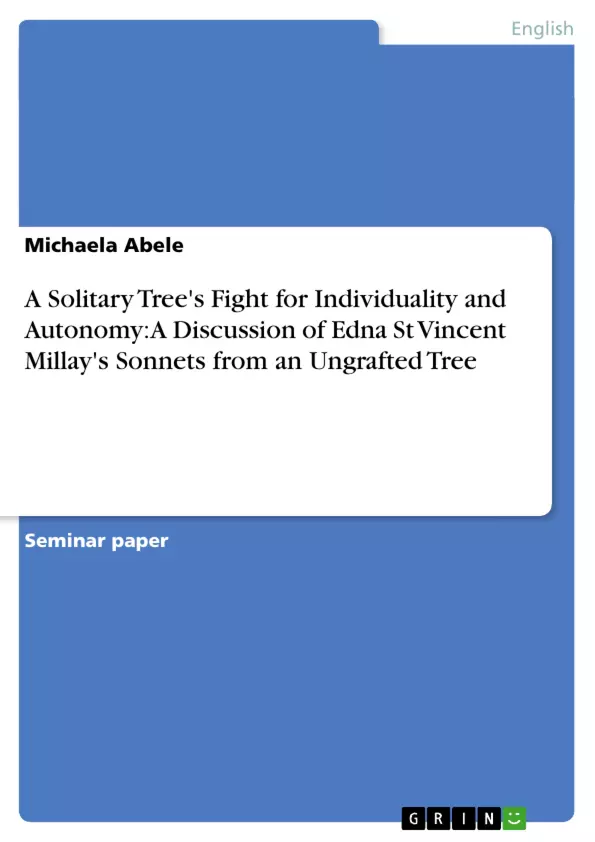Mankind is known for making the world subject to itself, mankind has gotten itself
involved in every imaginable aspect of life. We believe ourselves to govern nature: We build
artificial islands, we try to defeat diseases and death, we experiment with genetics to create
new life according to our ideals – not yet the lives of human beings, but those of plants and
animals. For centuries our ancestors have been selecting suitable cows and bulls for
reproduction in order to get promising breeds; they have been mingling different varieties of
corn to receive better harvests, to name but a few examples. Another method of changing
plants into another variety is grafting, a process that is not primarily used to change genetics,
but to combine features of several plants into one. “Grafting is a way to change a large tree
from an old to a new variety. It is also a method of using a root system better adapted to soil
or climate than that produced naturally by an ungrafted plant” (Rothenberger, 1). Edna St
Vincent Millay suggests in her poem Sonnets from an Ungrafted Tree that women in the
previous century had to bear a very similar fate to that of a tree to-be-grafted: Society wanted
women to be housewives, to obey and represent their husbands, to care for the family and to
forget about any ideas of developing their selves – as soon as this would go beyond
housekeeping. Therefore, women were brought up to put aside their own interests and to be
good wives and housekeepers; they were brought up to adapt to social restrictions, just like a
tree is grafted to better adapt to a certain environment, cut short of all branches that would
develop in another direction. However, the protagonist in Millay’s poem rejects the
traditional role of a housewife; she tries to escape and fights for individuality and autonomy
in opposition to being grafted. [...]
Inhaltsverzeichnis (Table of Contents)
- A Solitary Tree's Fight for Individuality and Autonomy
- Millay's Protagonist as Representative of the Group
- The Boundary Between the Individual and the Group
- The Protagonist's Attempts to Escape Conformity
- The Role of Society in Restricting Women's Self-Development
Zielsetzung und Themenschwerpunkte (Objectives and Key Themes)
This paper examines Edna St Vincent Millay's poem Sonnets from an Ungrafted Tree, arguing that the protagonist embodies both the collective identity of women and a unique individuality. The paper analyzes the protagonist's attempts to break free from societal expectations and explores the limitations imposed by society on women's self-development.
- The protagonist's struggle for individuality and autonomy
- The representation of women in society and their traditional roles
- The conflicting forces of conformity and individuality
- The impact of societal expectations on personal development
- The limitations of escape from social constructs
Zusammenfassung der Kapitel (Chapter Summaries)
- This paper explores the complex interplay between the individual and the group, analyzing Millay's protagonist in Sonnets from an Ungrafted Tree as a representative of the collective identity of women.
- The paper highlights how the protagonist embodies both typical female traits and unique characteristics that differentiate her from others. This analysis demonstrates the complexity of individual identity within a societal context.
- The paper examines the protagonist's attempts to escape societal expectations, focusing on her departure from her husband's household and her efforts to reject traditional female roles. However, the paper also acknowledges the limitations she faces in maintaining her newly gained independence.
Schlüsselwörter (Keywords)
Key terms and concepts explored in this analysis include individuality, autonomy, societal expectations, conformity, female identity, traditional roles, escape, and limitations.
Frequently Asked Questions
What is the central theme of Millay's "Sonnets from an Ungrafted Tree"?
The poem explores a woman's struggle for individuality and autonomy against societal expectations that demand she conform to traditional roles like housekeeping and obedience.
What does the metaphor of the "ungrafted tree" represent?
It represents a person who grows naturally without being "grafted" or forced to adapt to a specific environment or social restriction, symbolizing the fight for an authentic self.
How does the protagonist attempt to escape conformity?
She attempts to break free by departing from her husband's household and rejecting the typical female traits and roles assigned to her by the 19th-century society.
What role does society play in restricting women's development in the poem?
Society acts as a "grafter," cutting away branches of individuality to ensure women fit into the restricted roles of housewives who represent their husbands rather than themselves.
Does the protagonist successfully achieve full independence?
While she fights for autonomy, the paper acknowledges the limitations she faces in maintaining her independence within the rigid social constructs of her time.
- Arbeit zitieren
- Michaela Abele (Autor:in), 2004, A Solitary Tree's Fight for Individuality and Autonomy: A Discussion of Edna St Vincent Millay's Sonnets from an Ungrafted Tree, München, GRIN Verlag, https://www.grin.com/document/27638



